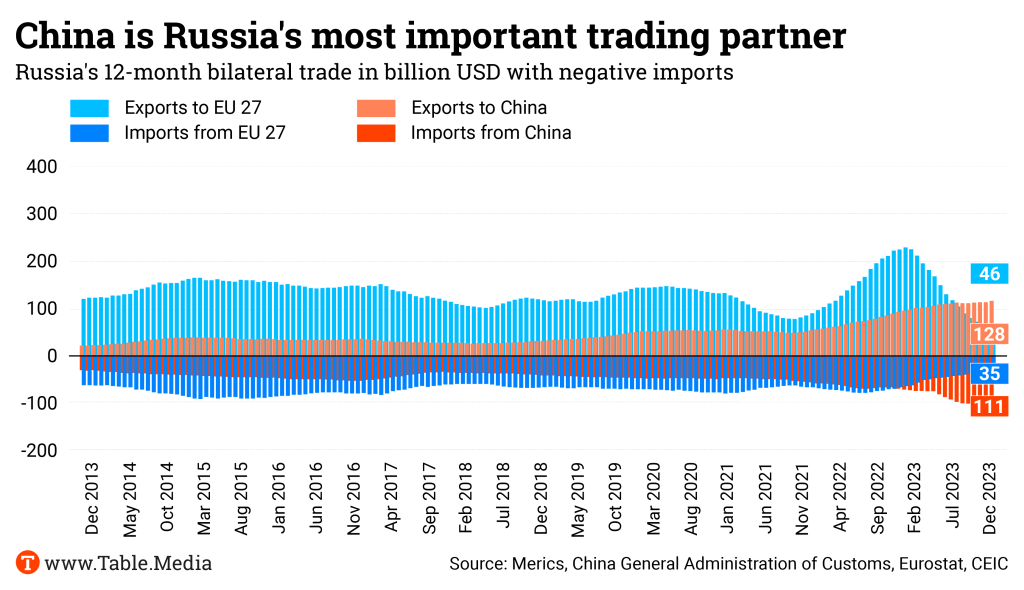The increasingly cited “limitless partnership” between Beijing and Moscow is becoming a growing security threat for Europe. This is the conclusion of a new joint report by the European China think tank Merics, the US-based German Marshall Fund (GMF), and the British think tank Chatham House. The authors state that China’s ongoing support for Russia in the war against Ukraine must influence our assessment of the People’s Republic. The image of China as a partner, competitor and systemic rival no longer fully captures the risk.
The political bond between the two countries is strong and flexible, but there are areas where we can take action, writes Amelie Richter, who has examined the study in detail. The relationship between China and Russia still lacks an ideological and legal foundation. Economic exchange is at the heart of their relationship, which gives the West room to maneuver.
Meanwhile, on China’s electric car market, a technology declared dead in Europe is experiencing a renaissance: the range extender. This involves a small engine with a generator. When the battery in an electric car runs out of power, the range extender recharges the battery. This technology is very popular in China – it has been adopted across all vehicle classes, explains Christian Domke Seidel in his Feature. At BMW and other manufacturers, the technology was considered too expensive and too heavy. Will this renaissance now force European manufacturers to rethink their approach?


China has evolved into a security threat for Europe through its relationship with Russia, a fact that Brussels should not underestimate despite economic interests. This is the core message of a report by the European China think tank Merics, the US-based German Marshall Fund (GMF), and the British think tank Chatham House. China’s ongoing support for Russia should change the assessment of the People’s Republic beyond the existing perception of China as a partner, competitor and systemic rival, write the authors, Abigaël Vasselier, Natalie Sabanadze, and Gunnar Wiegand, in the report published on Wednesday.
They call for a slight shift in political approach: “Attempts to drive a wedge between China and Russia are likely counterproductive. The focus should be on changing Beijing’s calculations for supporting Moscow.” Weakening the “unlimited partnership” agreed upon by Beijing and Moscow is difficult, according to the authors. The strong bilateral relations were highlighted by the meeting between China’s President Xi Jinping and Russian President Vladimir Putin in Beijing in May. Therefore, Beijing should be increasingly seen as a security threat alongside Russia, not just as an economic competitor.
“Security in Europe has traditionally been defined primarily by immediate threats from neighboring regions – from Russia and the Middle East to the Sahel zone,” explains Gunnar Wiegand, Visiting Distinguished Fellow at the GMF, to Table.Briefings. Security challenges from China have so far been primarily identified by Europe and the US in the Asia-Pacific region.
Cybersecurity was also a key focus. China’s de facto support for Russia, including massive exports of dual-use goods, has been recognized since the end of last year and addressed at the highest political levels. “But this has not led to any consequences so far,” says Wiegand, who until last year headed the Asia department of the European External Action Service as an EU diplomat.
The political bond between Beijing and Moscow is strong and flexible – but it lacks an ideological and legal foundation, states the report. The relationship is primarily centered on economic exchange: “China offers Russia an economic lifeline by helping Moscow circumvent Western sanctions and strengthen its military-industrial complex through unrestricted exports of critical dual-use goods.”
China is Russia’s most important trading partner. Trade between the People’s Republic and Russia has increased significantly since the invasion of Ukraine, supporting Moscow’s war objectives. Although there is no public evidence that Beijing is supplying lethal weapons to Russian forces, China’s export of goods still facilitates Moscow’s invasion.

Conversely, Chinese imports from Russia have continuously increased throughout the conflict. According to the US think tank Atlantic Council, China’s direct exports to Russia have only briefly declined twice since Moscow’s invasion of Ukraine: Both times when Chinese companies feared sanctions risks. This was the case in the early days of the Russian invasion in early 2022. The second instance saw a slight decline at the beginning of this year due to stricter Western sanctions imposed in December 2023 and production pauses for the Chinese New Year. The decline was temporary in both cases.
Moscow is now also adopting the exchange rate of the Chinese yuan to the ruble as a reference currency, after the US and EU expanded their sanctions against Russia on Wednesday, the country’s central bank announced on Thursday. As part of new measures against Russia and its supporters, the US and EU added 61 more companies to a sanctions list, including 19 from China. Among those affected are two key players in the Chinese satellite industry.
The new US sanctions prompted the Moscow Exchange to halt trading in dollars and euros on Thursday. Some banks in Russia also completely stopped selling US dollars, while the dollar-ruble exchange rate soared at some local banks. China sharply criticized the new Russia sanctions imposed by the EU. Beijing’s foreign ministry called them “unilateral sanctions without a basis in international law” that should be revoked.
Wiegand sees further need for action: “Additional steps will be necessary to prevent sanctions evasion and to curb the flow of dual-use goods from or through China to Russia.” If China does not stop the flow itself, the binding introduction of end-user certificates and corresponding monitoring will be necessary. Wiegand also raises the possibility of secondary sanctions. “This step would certainly be the most effective.” These would directly lead to consequences for companies or banks from third countries involved in sanctions evasion.

A range extender is a relatively small engine with a generator. When the battery in an electric car runs out of power, the range extender kicks in and recharges the battery. This technology is very popular in China and has been adopted across all vehicle classes, forcing European manufacturers to reconsider their stance. In Europe, this technology never really caught on. At the Vienna Motor Symposium in April, the concept took on a surprisingly prominent role.
Guenter Fraidl, Senior Vice President at AVL List – a global company focused on developing various automotive components – was a keynote speaker at the Vienna Motor Symposium. In his speech, he referred to the “renaissance of the range extender” in China, calling it a renaissance because the technology had previously been introduced in Europe but largely flopped.
The best example was the BMW i3. At its launch, the car was seen as the pinnacle of high-end and modern electric mobility. It was available in a purely electric version and with a range extender. However, the range extender version was 5,000 euros more expensive and 120 kilograms heavier. In a car that otherwise relied heavily on weight-saving carbon, this makeshift solution seemed very outdated. Additionally, the fuel tank could only hold nine liters because otherwise, the i3 would no longer have been classified as an electric car.
In China, the situation is different. There, the class of New Energy Vehicles (NEVs) essentially encompasses three different technologies. The largest share in 2023 was held by Battery Electric Vehicles (BEVs) at 68 percent. These are classic electric cars where an electric motor draws its energy from a battery. They were followed by plug-in hybrids (PHEVs) at 24 percent, which are vehicles where electric and combustion engines jointly provide propulsion. In third place, with nine percent, are electric vehicles with range extenders (EREVs).
Remarkably, since 2021, the sales of EREVs have increased by 492 percent. During the same period, BEV sales grew by 107 percent, and PHEV sales by 294 percent. A significant factor is the brand Li Auto, which consistently focuses on range extenders, building high-quality cars and thereby enhancing the overall image of the technology. Recently, however, their BEV family van, the Li Mega, flopped.
Moreover, despite the rapid expansion and government support in China, there are still gaps in the charging infrastructure, as explained by a representative from Aurobay. This joint venture between Geely and Renault supplies engines and transmissions for Geely’s subsidiaries Volvo, Polestar and Lynk&Co. At the Vienna Engine Symposium, they also presented plans for a new range extender.
During major holidays and peak vacation periods, if many Chinese families travel simultaneously, there would be simple gridlock at the charging stations. Range extenders would alleviate this situation. In everyday life, the vehicles would be almost exclusively electric. Fraidl calculates that about 85 percent of the kilometers driven would be electric.
Everything indicates that in the future battle for market share, range extenders will be essential, especially since their sales are growing much faster than the overall market. In China, manufacturers are vying with each other in their announcements.
The success of range extenders depends on scalability, which is achievable for two reasons. Firstly, this technology is not used for branding or image building. Customers don’t care who makes the engine that charges the battery. In China, the 1.5-liter gasoline engine has become the standard model offered by all manufacturers and suppliers. This means the significant price increase, which was one of the factors that prevented the success of the i3, is eliminated.
Secondly, the most expensive and heaviest part of an electric car is the battery. With a range extender, the battery would be about half the size, saving costs and weight. Aurobay states that in the premium SUV sector (where the batteries need to be particularly large), they can be up to 6,000 euros cheaper. Whether European manufacturers will follow this trend in China is still uncertain, as no announcements have been made.
As part of Digital and Transport Minister Volker Wissing’s visit, Germany and China signed a memorandum of understanding for a dialogue on cross-border data traffic. This is a subsequent step following the cooperation agreement on autonomous driving signed with China in April and complements the collaboration in the area of data exchange, the ministry announced on Wednesday. Wissing met with Zhuang Rongwen, the director of China’s Cyberspace Administration (CAC). “With our memorandum of understanding, we are establishing a continuous exchange and a shared understanding of the data policy legal framework between the two countries,” Wissing stated.
The issue of data exchange has particularly concerned foreign companies in China after Beijing initially imposed stricter regulations, which were later relaxed. Despite this, many questions remain unanswered. The topic of data transfer abroad encompasses various aspects that still need balancing, emphasizes lawyer Ralph Koppitz from Roedl & Partner in China. He cites examples such as individual protection, state security, know-how protection and the interest in efficient transfers. “Having a dialogue platform to develop solutions for these issues is highly commendable,” Koppitz says.
The German Association of the Automotive Industry (VDA) also views the dialogue forum positively. “Cross-border data transfer is crucial for German manufacturers and suppliers to remain globally leading in future technologies. Worldwide collected data is particularly essential for research and development in autonomous driving and driving safety,” stated VDA Managing Director Marcus Bollig. ari/jul
According to insiders, the US government is scrutinizing these three Chinese companies due to concerns that the state-supported firms might exploit their access to American data through their US-based cloud and internet operations. Three individuals familiar with the matter told Reuters that there is fear within the US government that these companies could provide information to Beijing. The investigation is being led by the Department of Commerce.
China’s leading telecom companies have a limited presence in the US, primarily through the provision of cloud services. Despite being banned from offering phone and internet services to US consumers by telecommunications regulators, these companies still have access to American data through their cloud operations. rtr
The developer of ChatGPT, OpenAI, has decided to block the use of its technology in China for the time being. According to a report from the state-owned financial newspaper Securities Times, Chinese users have been receiving notifications since Monday indicating that they are attempting to access the service from a “region not currently supported by OpenAI”.
While OpenAI’s AI software is not officially available in mainland China, it can still be accessed via VPNs or integrated into existing programs through APIs. Reports suggest that OpenAI CEO Sam Altman is concerned that Chinese developers might use ChatGPT as a basis to create their own applications. Consequently, starting July 9, additional measures will be implemented to block API traffic from unsupported regions.
Since the success of ChatGPT, Chinese providers have launched their own AI-based chatbot programs, including the tech group and search engine provider Baidu. In addition to China, countries where OpenAI is not officially available include Russia, Iran, Cuba, North Korea, Venezuela and Syria. fpe
Kyrgyz President Sadyr Zhaparov signed an agreement in Belgium to enhance the partnership and cooperation between Kyrgyzstan and the European Union. The signing took place on Tuesday during Zhaparov’s working visit to Brussels. Present were Charles Michel, President of the European Council; Jeenbek Kulubaev, Minister of Foreign Affairs of the Kyrgyz Republic; Josep Borrell, the EU’s High Representative for Foreign Affairs and Security Policy; and Valdis Dombrovskis, Vice-President of the European Commission.
According to an official EU statement, the cooperation will be strengthened in areas such as trade and investment, sustainable development and connectivity, research and innovation, education, environment and climate change, as well as rule of law, human rights, and civil society. Enhanced security cooperation is also anticipated.
The EU aims to create a counterweight to China’s strong presence in the region through the Belt and Road Initiative with the EPCA. Between January and April 2024, Kyrgyzstan’s bilateral trade with China exceeded its trade with all countries of the Eurasian Economic Union and the EU, according to the National Committee for Statistics. In June, China signed an agreement for a railway line connecting China with Kyrgyzstan and Uzbekistan, which will shorten the freight route between China and Europe by approximately 900 kilometers. fpe


Annalena Baerbock – Federal Minister for Foreign Affairs of Germany
Since she referred to the Chinese head of state and party leader Xi Jinping as a dictator on US television, she is no longer a welcome guest in Beijing. Indeed, no German foreign minister in recent decades has been as outspoken towards China as Annalena Baerbock. Raised in Hanover, she studied at the London School of Economics and Political Science. She was the state chair of the Brandenburg Greens before entering the Bundestag in 2013, where she served as the climate policy spokesperson for her parliamentary group. She ran as her party’s candidate for chancellor in the 2021 federal election and has been Germany’s first female foreign minister since 2021.

Reinhard Buetikofer – Former Chair of the European Greens and Chair of the Delegation for Relations with China in the EU Parliament, Chair of the German-Taiwan Dialogue Platform
Reinhard Buetikofer is not only a stalwart of the Greens but has also been engaged in China policy for decades. Active in the Society for German-Chinese Friendship (GDCF) since 1973, he evolved from being fascinated by Mao Zedong to a sharp critic of the communist leadership. As a deputy member of the Committee on Foreign Affairs and Chair of the EU Delegation for Relations with China, he strove for understanding and traveled regularly to Beijing. Since March 2021, he has been sanctioned by the Chinese leadership and is banned from entering China, Hong Kong and Macau. Now he focuses on fostering exchanges between Germany and Taiwan.

Nicolas Zippelius – Deputy Member of the Committee on Foreign Affairs, Member of the Bundestag, CDU
Nicolas Zippelius has been a member of the German Bundestag for the CDU since 2021. The political scientist from Karlsruhe is also a deputy member of the Foreign Affairs Committee. In April, Zippelius visited Beijing and Qingdao with a CDU delegation. His motto: “It is always better to talk with each other rather than about each other and this exchange should happen in person.” He generally advocates for more engagement with China, such as establishing a national China savviness center.

Franziska Brantner – Parliamentary State Secretary at the Federal Ministry for Economic Affairs and Climate Action
Franziska Brantner was already in China in 2000 for the UN General Assembly’s “Beijing+5” conference, a follow-up to the UN World Conference on Women in Beijing. Five years earlier, she was co-chair of the “Youth Caucus” of the UN Commission on the Status of Women. Brantner studied political science with a focus on international relations and European politics at Sciences Po in Paris and Columbia University’s School of International and Public Affairs in New York. In 2009, she was elected to the European Parliament for the Greens and served as the foreign policy spokesperson for the parliamentary group. She moved to the Bundestag in 2013 and has been a parliamentary state secretary in the ministry under Robert Habeck since 2021, working to reduce dependency on Chinese raw materials.

Michael Roth – Chairman of the Committee on Foreign Affairs, Member of the Bundestag, SPD
Michael Roth is the chair of the Foreign Affairs Committee of the German Bundestag. In this role, he has overseen and accompanied Germany’s foreign policy since December 2021. Previously, he was Minister of State for Europe in the Foreign Office. He has been a member of the Bundestag for the SPD since 1998. Roth is critical of China. Last year, he suggested that the future viability of the government consultations with China, originally intended for particularly close strategic value partners, should be reassessed, stating that the policies of the communist leadership under President Xi Jinping are “contrary to our values and interests”.

Norbert Röttgen – Member of the Committee on Foreign Affairs, Member of the Bundestag, CDU
Norbert Roettgen is one of Germany’s most prominent foreign policy experts. He is a member of the Foreign Affairs Committee and served as its chair from 2014 to 2021. He has made numerous trips to China, providing well-founded and clear assessments. He described China’s paper on resolving the Ukraine conflict as “not a peace paper, but an expression of Chinese interests.” He was highly critical of the German Chancellor’s trip to China. Roettgen, from Meckenheim, has been a member of the Bundestag since 1994.

Renata Alt – Chairwoman of the Committee on Human Rights and Humanitarian Aid, Member of the Bundestag, FDP
Renata Alt is the chair of the Committee on Human Rights and Humanitarian Aid. In this role, she is forthright. “It is my duty to speak plainly when human rights are violated,” says Alt, and she does so. She advocates for taking a clear stance towards China, having been consistently frustrated with the lenient foreign policy under Chancellor Angela Merkel. Alt has been a member of the Bundestag for the FDP since 2017 and is also a deputy member of the Foreign Affairs Committee.

Michael Brand – Spokesperson of the CDU/CSU Parliamentary Group for Human Rights, Chairman of the Tibet Working Group, Member of the Bundestag, CDU
Michael Brand studied political science, history and law in Bonn and spent a study abroad period in Sarajevo, where he worked as an OSCE election observer. Elected to the Bundestag for the Fulda constituency in 2005, he chaired the Committee on Human Rights and Humanitarian Aid from 2013 to 2021. He is particularly concerned with the oppressed Tibetans and Uyghurs in China.

René Repasi – SPD Member of the EU Parliament, Rapporteur in the Internal Market Committee
René Repasi studied German and French law in Montpellier and Heidelberg and completed his legal traineeship at the European Court of Justice and the European Commission’s Directorate-General for Justice and Consumers. From 2014 to 2018, he was the scientific director of the European Research Center for Economic and Financial Governance at the Universities of Leiden and Delft. Since 2018, he has been a professor at Erasmus University Rotterdam. In the EU Parliament, he focuses on foreign trade and is involved in the proposed EU supply chain law and the implementation of the China strategy to mitigate risks in trade relations with Beijing.

Hans-Peter Friedrich – Chairman of the German-Chinese Parliamentary Group, Member of the Bundestag, CSU
Hans-Peter Friedrich is the chair of the German-Chinese Parliamentary Group and the initiator of the China Bruecke e.V. The idea for this dialogue platform came to Friedrich during a trip to China four years ago. He first visited China over 20 years ago in Wuhan. His approach to China is shaped by his work as a domestic and economic policy maker. Friedrich is not interested in geopolitical competition but in finding a way to cooperate. He believes, “Germany and China are optimal partners“. Friedrich is from Upper Franconia and has been a member of the Bundestag for the CSU since 1998.
Pawel Partycki has been General Manager – Harmony Auto Poland, an investment holding company that sells cars in Europe, China and the Asia-Pacific region, since June. In Europe, the company offers modern Chinese cars and is the leading dealer of BYD cars. Partycki is based in Warsaw.
Nancy Xiaowen Jiang has been Head of China Rising Stars EMEA/UKI at DHL Supply Chain since June. Her responsibilities include supporting customers from China in their search for the best supply chain solutions in Europe. Jiang has been working for the logistics company in Bonn for four years, most recently as a Senior Consultant.
Is something changing in your organization? Let us know at heads@table.media!

In our region, the durian is derogatorily referred to as the “cheese fruit” or “stinky fruit” because of its strong smell. However, the Chinese can’t get enough of the liú lián 榴莲. The demand has been growing for years. Companies like Guangxi Xuan Ma Food process it into cakes and cookies. It is also found in milk tea or as a pizza topping here. Traditional suppliers have been Thailand and Vietnam until now. After the visit of Chinese Premier Li Qiang last week, Malaysia can now also boost its exports to China.
The increasingly cited “limitless partnership” between Beijing and Moscow is becoming a growing security threat for Europe. This is the conclusion of a new joint report by the European China think tank Merics, the US-based German Marshall Fund (GMF), and the British think tank Chatham House. The authors state that China’s ongoing support for Russia in the war against Ukraine must influence our assessment of the People’s Republic. The image of China as a partner, competitor and systemic rival no longer fully captures the risk.
The political bond between the two countries is strong and flexible, but there are areas where we can take action, writes Amelie Richter, who has examined the study in detail. The relationship between China and Russia still lacks an ideological and legal foundation. Economic exchange is at the heart of their relationship, which gives the West room to maneuver.
Meanwhile, on China’s electric car market, a technology declared dead in Europe is experiencing a renaissance: the range extender. This involves a small engine with a generator. When the battery in an electric car runs out of power, the range extender recharges the battery. This technology is very popular in China – it has been adopted across all vehicle classes, explains Christian Domke Seidel in his Feature. At BMW and other manufacturers, the technology was considered too expensive and too heavy. Will this renaissance now force European manufacturers to rethink their approach?


China has evolved into a security threat for Europe through its relationship with Russia, a fact that Brussels should not underestimate despite economic interests. This is the core message of a report by the European China think tank Merics, the US-based German Marshall Fund (GMF), and the British think tank Chatham House. China’s ongoing support for Russia should change the assessment of the People’s Republic beyond the existing perception of China as a partner, competitor and systemic rival, write the authors, Abigaël Vasselier, Natalie Sabanadze, and Gunnar Wiegand, in the report published on Wednesday.
They call for a slight shift in political approach: “Attempts to drive a wedge between China and Russia are likely counterproductive. The focus should be on changing Beijing’s calculations for supporting Moscow.” Weakening the “unlimited partnership” agreed upon by Beijing and Moscow is difficult, according to the authors. The strong bilateral relations were highlighted by the meeting between China’s President Xi Jinping and Russian President Vladimir Putin in Beijing in May. Therefore, Beijing should be increasingly seen as a security threat alongside Russia, not just as an economic competitor.
“Security in Europe has traditionally been defined primarily by immediate threats from neighboring regions – from Russia and the Middle East to the Sahel zone,” explains Gunnar Wiegand, Visiting Distinguished Fellow at the GMF, to Table.Briefings. Security challenges from China have so far been primarily identified by Europe and the US in the Asia-Pacific region.
Cybersecurity was also a key focus. China’s de facto support for Russia, including massive exports of dual-use goods, has been recognized since the end of last year and addressed at the highest political levels. “But this has not led to any consequences so far,” says Wiegand, who until last year headed the Asia department of the European External Action Service as an EU diplomat.
The political bond between Beijing and Moscow is strong and flexible – but it lacks an ideological and legal foundation, states the report. The relationship is primarily centered on economic exchange: “China offers Russia an economic lifeline by helping Moscow circumvent Western sanctions and strengthen its military-industrial complex through unrestricted exports of critical dual-use goods.”
China is Russia’s most important trading partner. Trade between the People’s Republic and Russia has increased significantly since the invasion of Ukraine, supporting Moscow’s war objectives. Although there is no public evidence that Beijing is supplying lethal weapons to Russian forces, China’s export of goods still facilitates Moscow’s invasion.

Conversely, Chinese imports from Russia have continuously increased throughout the conflict. According to the US think tank Atlantic Council, China’s direct exports to Russia have only briefly declined twice since Moscow’s invasion of Ukraine: Both times when Chinese companies feared sanctions risks. This was the case in the early days of the Russian invasion in early 2022. The second instance saw a slight decline at the beginning of this year due to stricter Western sanctions imposed in December 2023 and production pauses for the Chinese New Year. The decline was temporary in both cases.
Moscow is now also adopting the exchange rate of the Chinese yuan to the ruble as a reference currency, after the US and EU expanded their sanctions against Russia on Wednesday, the country’s central bank announced on Thursday. As part of new measures against Russia and its supporters, the US and EU added 61 more companies to a sanctions list, including 19 from China. Among those affected are two key players in the Chinese satellite industry.
The new US sanctions prompted the Moscow Exchange to halt trading in dollars and euros on Thursday. Some banks in Russia also completely stopped selling US dollars, while the dollar-ruble exchange rate soared at some local banks. China sharply criticized the new Russia sanctions imposed by the EU. Beijing’s foreign ministry called them “unilateral sanctions without a basis in international law” that should be revoked.
Wiegand sees further need for action: “Additional steps will be necessary to prevent sanctions evasion and to curb the flow of dual-use goods from or through China to Russia.” If China does not stop the flow itself, the binding introduction of end-user certificates and corresponding monitoring will be necessary. Wiegand also raises the possibility of secondary sanctions. “This step would certainly be the most effective.” These would directly lead to consequences for companies or banks from third countries involved in sanctions evasion.

A range extender is a relatively small engine with a generator. When the battery in an electric car runs out of power, the range extender kicks in and recharges the battery. This technology is very popular in China and has been adopted across all vehicle classes, forcing European manufacturers to reconsider their stance. In Europe, this technology never really caught on. At the Vienna Motor Symposium in April, the concept took on a surprisingly prominent role.
Guenter Fraidl, Senior Vice President at AVL List – a global company focused on developing various automotive components – was a keynote speaker at the Vienna Motor Symposium. In his speech, he referred to the “renaissance of the range extender” in China, calling it a renaissance because the technology had previously been introduced in Europe but largely flopped.
The best example was the BMW i3. At its launch, the car was seen as the pinnacle of high-end and modern electric mobility. It was available in a purely electric version and with a range extender. However, the range extender version was 5,000 euros more expensive and 120 kilograms heavier. In a car that otherwise relied heavily on weight-saving carbon, this makeshift solution seemed very outdated. Additionally, the fuel tank could only hold nine liters because otherwise, the i3 would no longer have been classified as an electric car.
In China, the situation is different. There, the class of New Energy Vehicles (NEVs) essentially encompasses three different technologies. The largest share in 2023 was held by Battery Electric Vehicles (BEVs) at 68 percent. These are classic electric cars where an electric motor draws its energy from a battery. They were followed by plug-in hybrids (PHEVs) at 24 percent, which are vehicles where electric and combustion engines jointly provide propulsion. In third place, with nine percent, are electric vehicles with range extenders (EREVs).
Remarkably, since 2021, the sales of EREVs have increased by 492 percent. During the same period, BEV sales grew by 107 percent, and PHEV sales by 294 percent. A significant factor is the brand Li Auto, which consistently focuses on range extenders, building high-quality cars and thereby enhancing the overall image of the technology. Recently, however, their BEV family van, the Li Mega, flopped.
Moreover, despite the rapid expansion and government support in China, there are still gaps in the charging infrastructure, as explained by a representative from Aurobay. This joint venture between Geely and Renault supplies engines and transmissions for Geely’s subsidiaries Volvo, Polestar and Lynk&Co. At the Vienna Engine Symposium, they also presented plans for a new range extender.
During major holidays and peak vacation periods, if many Chinese families travel simultaneously, there would be simple gridlock at the charging stations. Range extenders would alleviate this situation. In everyday life, the vehicles would be almost exclusively electric. Fraidl calculates that about 85 percent of the kilometers driven would be electric.
Everything indicates that in the future battle for market share, range extenders will be essential, especially since their sales are growing much faster than the overall market. In China, manufacturers are vying with each other in their announcements.
The success of range extenders depends on scalability, which is achievable for two reasons. Firstly, this technology is not used for branding or image building. Customers don’t care who makes the engine that charges the battery. In China, the 1.5-liter gasoline engine has become the standard model offered by all manufacturers and suppliers. This means the significant price increase, which was one of the factors that prevented the success of the i3, is eliminated.
Secondly, the most expensive and heaviest part of an electric car is the battery. With a range extender, the battery would be about half the size, saving costs and weight. Aurobay states that in the premium SUV sector (where the batteries need to be particularly large), they can be up to 6,000 euros cheaper. Whether European manufacturers will follow this trend in China is still uncertain, as no announcements have been made.
As part of Digital and Transport Minister Volker Wissing’s visit, Germany and China signed a memorandum of understanding for a dialogue on cross-border data traffic. This is a subsequent step following the cooperation agreement on autonomous driving signed with China in April and complements the collaboration in the area of data exchange, the ministry announced on Wednesday. Wissing met with Zhuang Rongwen, the director of China’s Cyberspace Administration (CAC). “With our memorandum of understanding, we are establishing a continuous exchange and a shared understanding of the data policy legal framework between the two countries,” Wissing stated.
The issue of data exchange has particularly concerned foreign companies in China after Beijing initially imposed stricter regulations, which were later relaxed. Despite this, many questions remain unanswered. The topic of data transfer abroad encompasses various aspects that still need balancing, emphasizes lawyer Ralph Koppitz from Roedl & Partner in China. He cites examples such as individual protection, state security, know-how protection and the interest in efficient transfers. “Having a dialogue platform to develop solutions for these issues is highly commendable,” Koppitz says.
The German Association of the Automotive Industry (VDA) also views the dialogue forum positively. “Cross-border data transfer is crucial for German manufacturers and suppliers to remain globally leading in future technologies. Worldwide collected data is particularly essential for research and development in autonomous driving and driving safety,” stated VDA Managing Director Marcus Bollig. ari/jul
According to insiders, the US government is scrutinizing these three Chinese companies due to concerns that the state-supported firms might exploit their access to American data through their US-based cloud and internet operations. Three individuals familiar with the matter told Reuters that there is fear within the US government that these companies could provide information to Beijing. The investigation is being led by the Department of Commerce.
China’s leading telecom companies have a limited presence in the US, primarily through the provision of cloud services. Despite being banned from offering phone and internet services to US consumers by telecommunications regulators, these companies still have access to American data through their cloud operations. rtr
The developer of ChatGPT, OpenAI, has decided to block the use of its technology in China for the time being. According to a report from the state-owned financial newspaper Securities Times, Chinese users have been receiving notifications since Monday indicating that they are attempting to access the service from a “region not currently supported by OpenAI”.
While OpenAI’s AI software is not officially available in mainland China, it can still be accessed via VPNs or integrated into existing programs through APIs. Reports suggest that OpenAI CEO Sam Altman is concerned that Chinese developers might use ChatGPT as a basis to create their own applications. Consequently, starting July 9, additional measures will be implemented to block API traffic from unsupported regions.
Since the success of ChatGPT, Chinese providers have launched their own AI-based chatbot programs, including the tech group and search engine provider Baidu. In addition to China, countries where OpenAI is not officially available include Russia, Iran, Cuba, North Korea, Venezuela and Syria. fpe
Kyrgyz President Sadyr Zhaparov signed an agreement in Belgium to enhance the partnership and cooperation between Kyrgyzstan and the European Union. The signing took place on Tuesday during Zhaparov’s working visit to Brussels. Present were Charles Michel, President of the European Council; Jeenbek Kulubaev, Minister of Foreign Affairs of the Kyrgyz Republic; Josep Borrell, the EU’s High Representative for Foreign Affairs and Security Policy; and Valdis Dombrovskis, Vice-President of the European Commission.
According to an official EU statement, the cooperation will be strengthened in areas such as trade and investment, sustainable development and connectivity, research and innovation, education, environment and climate change, as well as rule of law, human rights, and civil society. Enhanced security cooperation is also anticipated.
The EU aims to create a counterweight to China’s strong presence in the region through the Belt and Road Initiative with the EPCA. Between January and April 2024, Kyrgyzstan’s bilateral trade with China exceeded its trade with all countries of the Eurasian Economic Union and the EU, according to the National Committee for Statistics. In June, China signed an agreement for a railway line connecting China with Kyrgyzstan and Uzbekistan, which will shorten the freight route between China and Europe by approximately 900 kilometers. fpe


Annalena Baerbock – Federal Minister for Foreign Affairs of Germany
Since she referred to the Chinese head of state and party leader Xi Jinping as a dictator on US television, she is no longer a welcome guest in Beijing. Indeed, no German foreign minister in recent decades has been as outspoken towards China as Annalena Baerbock. Raised in Hanover, she studied at the London School of Economics and Political Science. She was the state chair of the Brandenburg Greens before entering the Bundestag in 2013, where she served as the climate policy spokesperson for her parliamentary group. She ran as her party’s candidate for chancellor in the 2021 federal election and has been Germany’s first female foreign minister since 2021.

Reinhard Buetikofer – Former Chair of the European Greens and Chair of the Delegation for Relations with China in the EU Parliament, Chair of the German-Taiwan Dialogue Platform
Reinhard Buetikofer is not only a stalwart of the Greens but has also been engaged in China policy for decades. Active in the Society for German-Chinese Friendship (GDCF) since 1973, he evolved from being fascinated by Mao Zedong to a sharp critic of the communist leadership. As a deputy member of the Committee on Foreign Affairs and Chair of the EU Delegation for Relations with China, he strove for understanding and traveled regularly to Beijing. Since March 2021, he has been sanctioned by the Chinese leadership and is banned from entering China, Hong Kong and Macau. Now he focuses on fostering exchanges between Germany and Taiwan.

Nicolas Zippelius – Deputy Member of the Committee on Foreign Affairs, Member of the Bundestag, CDU
Nicolas Zippelius has been a member of the German Bundestag for the CDU since 2021. The political scientist from Karlsruhe is also a deputy member of the Foreign Affairs Committee. In April, Zippelius visited Beijing and Qingdao with a CDU delegation. His motto: “It is always better to talk with each other rather than about each other and this exchange should happen in person.” He generally advocates for more engagement with China, such as establishing a national China savviness center.

Franziska Brantner – Parliamentary State Secretary at the Federal Ministry for Economic Affairs and Climate Action
Franziska Brantner was already in China in 2000 for the UN General Assembly’s “Beijing+5” conference, a follow-up to the UN World Conference on Women in Beijing. Five years earlier, she was co-chair of the “Youth Caucus” of the UN Commission on the Status of Women. Brantner studied political science with a focus on international relations and European politics at Sciences Po in Paris and Columbia University’s School of International and Public Affairs in New York. In 2009, she was elected to the European Parliament for the Greens and served as the foreign policy spokesperson for the parliamentary group. She moved to the Bundestag in 2013 and has been a parliamentary state secretary in the ministry under Robert Habeck since 2021, working to reduce dependency on Chinese raw materials.

Michael Roth – Chairman of the Committee on Foreign Affairs, Member of the Bundestag, SPD
Michael Roth is the chair of the Foreign Affairs Committee of the German Bundestag. In this role, he has overseen and accompanied Germany’s foreign policy since December 2021. Previously, he was Minister of State for Europe in the Foreign Office. He has been a member of the Bundestag for the SPD since 1998. Roth is critical of China. Last year, he suggested that the future viability of the government consultations with China, originally intended for particularly close strategic value partners, should be reassessed, stating that the policies of the communist leadership under President Xi Jinping are “contrary to our values and interests”.

Norbert Röttgen – Member of the Committee on Foreign Affairs, Member of the Bundestag, CDU
Norbert Roettgen is one of Germany’s most prominent foreign policy experts. He is a member of the Foreign Affairs Committee and served as its chair from 2014 to 2021. He has made numerous trips to China, providing well-founded and clear assessments. He described China’s paper on resolving the Ukraine conflict as “not a peace paper, but an expression of Chinese interests.” He was highly critical of the German Chancellor’s trip to China. Roettgen, from Meckenheim, has been a member of the Bundestag since 1994.

Renata Alt – Chairwoman of the Committee on Human Rights and Humanitarian Aid, Member of the Bundestag, FDP
Renata Alt is the chair of the Committee on Human Rights and Humanitarian Aid. In this role, she is forthright. “It is my duty to speak plainly when human rights are violated,” says Alt, and she does so. She advocates for taking a clear stance towards China, having been consistently frustrated with the lenient foreign policy under Chancellor Angela Merkel. Alt has been a member of the Bundestag for the FDP since 2017 and is also a deputy member of the Foreign Affairs Committee.

Michael Brand – Spokesperson of the CDU/CSU Parliamentary Group for Human Rights, Chairman of the Tibet Working Group, Member of the Bundestag, CDU
Michael Brand studied political science, history and law in Bonn and spent a study abroad period in Sarajevo, where he worked as an OSCE election observer. Elected to the Bundestag for the Fulda constituency in 2005, he chaired the Committee on Human Rights and Humanitarian Aid from 2013 to 2021. He is particularly concerned with the oppressed Tibetans and Uyghurs in China.

René Repasi – SPD Member of the EU Parliament, Rapporteur in the Internal Market Committee
René Repasi studied German and French law in Montpellier and Heidelberg and completed his legal traineeship at the European Court of Justice and the European Commission’s Directorate-General for Justice and Consumers. From 2014 to 2018, he was the scientific director of the European Research Center for Economic and Financial Governance at the Universities of Leiden and Delft. Since 2018, he has been a professor at Erasmus University Rotterdam. In the EU Parliament, he focuses on foreign trade and is involved in the proposed EU supply chain law and the implementation of the China strategy to mitigate risks in trade relations with Beijing.

Hans-Peter Friedrich – Chairman of the German-Chinese Parliamentary Group, Member of the Bundestag, CSU
Hans-Peter Friedrich is the chair of the German-Chinese Parliamentary Group and the initiator of the China Bruecke e.V. The idea for this dialogue platform came to Friedrich during a trip to China four years ago. He first visited China over 20 years ago in Wuhan. His approach to China is shaped by his work as a domestic and economic policy maker. Friedrich is not interested in geopolitical competition but in finding a way to cooperate. He believes, “Germany and China are optimal partners“. Friedrich is from Upper Franconia and has been a member of the Bundestag for the CSU since 1998.
Pawel Partycki has been General Manager – Harmony Auto Poland, an investment holding company that sells cars in Europe, China and the Asia-Pacific region, since June. In Europe, the company offers modern Chinese cars and is the leading dealer of BYD cars. Partycki is based in Warsaw.
Nancy Xiaowen Jiang has been Head of China Rising Stars EMEA/UKI at DHL Supply Chain since June. Her responsibilities include supporting customers from China in their search for the best supply chain solutions in Europe. Jiang has been working for the logistics company in Bonn for four years, most recently as a Senior Consultant.
Is something changing in your organization? Let us know at heads@table.media!

In our region, the durian is derogatorily referred to as the “cheese fruit” or “stinky fruit” because of its strong smell. However, the Chinese can’t get enough of the liú lián 榴莲. The demand has been growing for years. Companies like Guangxi Xuan Ma Food process it into cakes and cookies. It is also found in milk tea or as a pizza topping here. Traditional suppliers have been Thailand and Vietnam until now. After the visit of Chinese Premier Li Qiang last week, Malaysia can now also boost its exports to China.